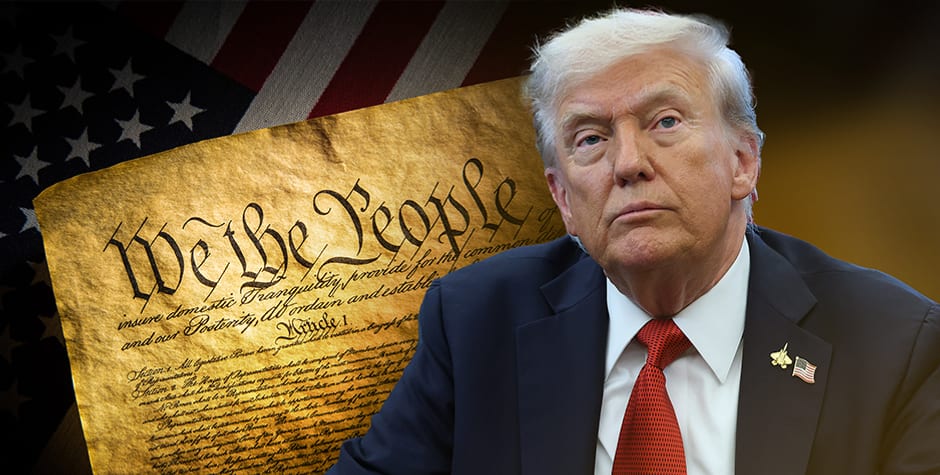ACLJ Files at the Supreme Court Defending the President’s Constitutional Authority
Listen tothis article
The ACLJ has filed a major amicus brief with the Supreme Court of the United States in Trump v. Slaughter, defending the President’s constitutional authority to remove principal executive officers who exercise the powers of the Executive branch on behalf of the American people.
This case presents a fundamental constitutional question: Can a federal law insulate Federal Trade Commission (FTC) Commissioners—principal officers wielding substantial executive power—from the President’s control? The constitutional answer is clear. The Constitution does not permit it. Article II vests “[t]he executive Power” in the President alone, not in Congress or a collection of unaccountable commissioners. The President must be able to remove those who execute the law on his behalf; otherwise, the Constitution’s promise of democratic accountability is rendered meaningless.
The case began when Trump fired FTC Commissioner Slaughter in spring 2025, and a federal appeals court ruled that she must be reinstated. The Trump Administration sought a stay of that ruling, which the Supreme Court granted on September 22, 2025, allowing the firing to remain in place while the case proceeds. While the case concerns the FTC specifically, it concerns fundamental questions about separation of powers and the government of the Executive branch.
Take action with us. Help us defeat activist judges and sign the petition: Defeat Rogue Judges – Defend the Constitution.
Defending the Constitutional Separation of Powers
As our brief explains, the separation of powers was not an accident — it was an intentional safeguard designed to protect liberty. The Founders understood that energy in the Executive was essential to good government. The President cannot do his duty to “take Care that the Laws be faithfully executed” if he cannot supervise or remove those entrusted to carry out those laws.
For too long, statutory provisions have blurred this constitutional line by creating so-called “independent agencies” whose leaders claim immunity from presidential oversight. Our brief demonstrates that modern agencies such as the Federal Trade Commission (FTC) wield significant executive power — they investigate, prosecute, and enforce federal law — yet claim independence from the President. That arrangement, we argue, violates Article II and undermines the people’s ability to hold their government accountable. The President must be able to remove those who assist him in executing the law, or the Constitution becomes an empty promise and accountability to the people disappears.
Revisiting a Flawed Precedent
The ACLJ urges the Court to revisit and overturn its 1935 decision in Humphrey’s Executor v. United States, which permitted Congress to shield FTC commissioners from removal. The FTC of 1935 bears little resemblance to today’s powerful agency. Since that time, Congress has granted the Commission broad enforcement, investigative, and rulemaking powers — powers that are unmistakably executive in nature. As our brief explains, “Whatever Humphrey’s Executor may have meant in 1935, it cannot govern today’s FTC.” The Constitution creates three branches, not four, and Congress cannot establish a “headless fourth branch” of government that operates outside presidential control.
Preserving Accountability and Liberty
This is not just about President Trump or the current Administration, it is about preserving the structure of government that secures the people’s liberty. When agencies that execute the law are beyond presidential supervision, the American people lose their ability to hold anyone accountable for the actions of their government.
Our position is simple: Executive power belongs to the President. The Framers designed it that way to ensure unity, responsibility, and transparency in government. When unelected officials that wield executive power are shielded from removal, that unity is shattered, and the will of the voters is thwarted. The ACLJ will continue to stand before the Court and across the nation to defend the Constitution’s original design.
When unelected officials attempt to operate beyond the President’s authority, the ACLJ is there to fight back. The Constitution vests executive power in one President—not in bureaucrats who answer to no one. We will keep defending that truth in every courtroom and every arena where liberty is threatened.
At its core, this case is about accountability. The American people elect a President to execute the law. They hold him responsible for how the Executive branch operates. But if the President cannot control those doing the executing, democratic accountability vanishes. This is why we are battling rogue judges to preserve presidential powers. Take action with us and add your name to the petition: Defeat Rogue Judges – Defend the Constitution.
